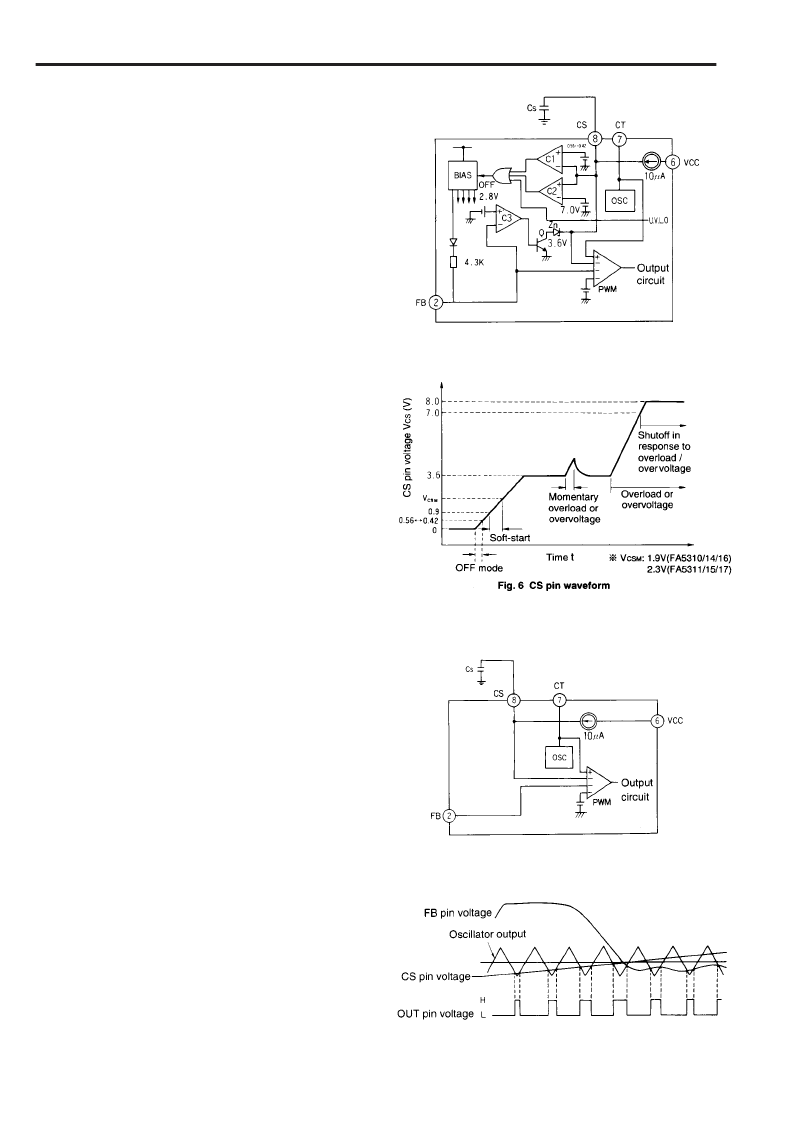- 您現(xiàn)在的位置:買賣IC網(wǎng) > PDF目錄375715 > FA5311 (FUJI ELECTRIC HOLDINGS CO., LTD.) CAP 100PF 50V 5% C0G SMD-0603 TR-7-PA SN100 PDF資料下載
參數(shù)資料
| 型號(hào): | FA5311 |
| 廠商: | FUJI ELECTRIC HOLDINGS CO., LTD. |
| 英文描述: | CAP 100PF 50V 5% C0G SMD-0603 TR-7-PA SN100 |
| 中文描述: | 雙極集成電路開(kāi)關(guān)電源控制 |
| 文件頁(yè)數(shù): | 5/17頁(yè) |
| 文件大小: | 263K |
| 代理商: | FA5311 |
第1頁(yè)第2頁(yè)第3頁(yè)第4頁(yè)當(dāng)前第5頁(yè)第6頁(yè)第7頁(yè)第8頁(yè)第9頁(yè)第10頁(yè)第11頁(yè)第12頁(yè)第13頁(yè)第14頁(yè)第15頁(yè)第16頁(yè)第17頁(yè)

5
FA531X series
4. CS pin circuit
As shown in Figure 5 capacitor C
S
is connected to the CS pin.
When power is turned on, the constant current source (10
μ
A)
begins to charge capacitor C
S
. Accordingly, the CS pin
voltage rises as shown in Figure 6. The CS pin is connected to
an input of the PWM comparator. The device is in soft-start
mode while the CS pin voltage is between 0.9V and 1.9V
(FA5310/14/16) and between 0.9V and 2.3V(FA5311/15/17).
During normal operation, the CS pin is clamped at 3.6V by
internal zener diode Zn. If the output voltage drops due to an
overload, etc., the clamp voltage shifts from 3.6V to 8.0V. As a
result, the CS pin voltage rises to 8.0V. The CS pin is also
connected to latch comparator C2. If the pin voltage rises
above 7.0V, the output of comparator C2 goes high to turn off
the bias circuit, thereby shutting the output down. Comparator
C2 can be used not only for shutdown in response to an
overload, but also for shutdown in response to an overvoltage.
Comparator C1 is also connected to the CS pin, and the bias
circuit is turned off and the output is shut down if the CS pin
voltage drops below 0.42V. In this way, comparator C1 can
also be used for output on/off control.
As explained above, the CS pin can be used for soft-start
operation, overload and overvoltage output shutdown and
output on/off control.
Further details on the four functions of the CS pin are given
below.
4.1 Soft start function
Figure 7 shows the soft start circuit. Figure 8 is the soft-start
operation timing chart. The CS pin is connected to capacitor
C
S
. When power is turned on, a 10
μ
A constant-current source
begins to charge the capacitor. As shown in the timing chart,
the CS pin voltage rises slowly in response to the charging
current. The CS pin is connected internally to the PWM
comparator. The comparator output pulse slowly widens as
shown in the timing chart.
The soft start period can be approximately evaluated by the
period ts from the time the IC is activated to the time the output
pulse width widens to 30%. Period ts is given by the following
equation:
t
S
(m
S
)=160C
S
(
μ
F)...................................(2)
Fig. 5 CS pin circuit
Fig. 6 CS pin waveform
Fig. 7 Soft-start circuit
Fig. 8 Soft-start timing chart
相關(guān)PDF資料 |
PDF描述 |
|---|---|
| FA5311BP | Bipolar IC For Switching Power Supply Control |
| FA5311BPS | Bipolar IC For Switching Power Supply Control |
| FA5314PS | Bipolar IC For Switching Power Supply Control |
| FA5315P | Bipolar IC For Switching Power Supply Control |
| FA5315PS | Bipolar IC For Switching Power Supply Control |
相關(guān)代理商/技術(shù)參數(shù) |
參數(shù)描述 |
|---|---|
| FA5311BP | 制造商:FUJI 制造商全稱:Fuji Electric 功能描述:Bipolar IC For Switching Power Supply Control |
| FA5311BP(S) | 制造商:未知廠家 制造商全稱:未知廠家 功能描述: |
| FA5311BPS | 制造商:FUJI 制造商全稱:Fuji Electric 功能描述:Bipolar IC For Switching Power Supply Control |
| FA5311BS | 制造商:未知廠家 制造商全稱:未知廠家 功能描述:(374.50 k) |
| FA5311P | 制造商:Panasonic Industrial Company 功能描述:IC |
發(fā)布緊急采購(gòu),3分鐘左右您將得到回復(fù)。